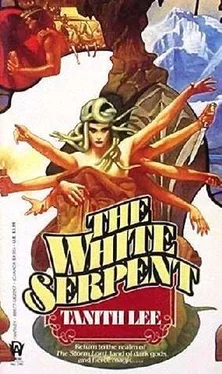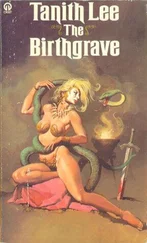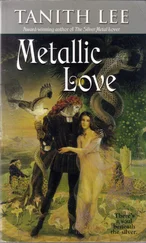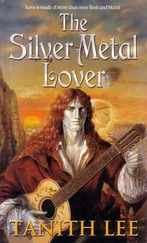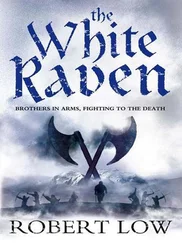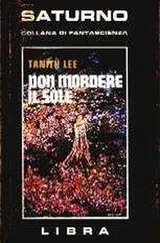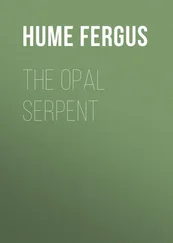Panduv raced upward through the villa.
Stairs passed under her and walls tumbled down.
On the roof terrace, the sky had indeed unreefed itself, a rent blue-black sail. Peaks of the city were stabbed out in a weird yellowish glare against its dark.
Two female servants collapsed on their noses before her.
The awning flapped with a horrible loudness. The nurse woman began to wail again.
Panduv reached the fish pond and looked into its cloudy eye. There in the pupil lay her child, face down under a spurling ink of hair.
A prophecy fulfilled. A circlet joined. Be rid of the unborn, and the born also you were rid of.
Panduv did not think. She reached into the pool and gripped the form of Teis, which no longer had the texture of anything fleshly, or familiar. Panduv pulled forth this object, and turning it over her knee, squeezed the water out. Then she tossed the child, like the unreal thing it had become, on its back. In the avenue of the child’s throat a fish had lodged. Panduv, like a magician, brought it forth and threw it into the pond. Miraculously, the fish began at once to live and swam swiftly under a pebble.
She was a Daughter of Daigoth’s Courts. She knew many clever tricks. She slammed her child across the breast an appalling blow, hateful, that set the staring women off into hysteria once more. Then Panduv, leaning to her child’s face, kissed her mouth, a hoarsely sighing kiss of love after the blow of hate. (So it appeared to the women, who described it afterward in superstitious awe.) A kiss. And the beaten chest of the little girl lifted.
The child’s lids parted and Teis was there, in the eyes. She crowed and choked and howled, clutching her mother. Panduv held her fast, and the storm cracked like a goblet and water swept over them all.
The harvested plant would not provide sufficient maleficence again for some days. She could then remake the brew, but perhaps too late. She would not bother. Holding her child, Panduv was conscious that she had accepted also the second child, the spark of fire lodged gemlike in the girdle of her belly. The sly goddess of Iscah had outwitted her, and what Cah willed you could not go against. The pregnant mother was sacred to Cah. Then, let it be.
“All this to come home to! You’re nothing but trouble to me, you Zakr wench.”
Arud ranted, quartering the chamber with a prowling plod. After the storm the night was massive and fragrant, limitless and cooled with stars. His litter had arrived two hours after midnight. He was not so sodden as the general rule, but discontented over some minor slight, for the more weighty his spiritual dominance the more he valued himself, and the more he knew himself envied.
His holy robes swung around his thick body, their richness dazzling. On his breast the insignia of the Adorer, a pectoral in which two golden figures revered a disc of jet and topaz, clicked and wriggled with its own irritation. He had about him, all over his smooth surfaces, even in his splendid hair, the tang of incense.
It would have been the clerk who sent a cautious message to Arud, arranged for it to be waiting at the temple porch. The message reviewed the buying and manumission of a galley-slave, in honor of the festival.
Ready for sleep, Arud had awakened. He had come directly to her, this fly-brained Zakr wretch, the curse of his house. He discovered her seated in her chair, polished ebony in a silk mantle, her black mane mantling over it. Her glamour only set him off worse.
She bore the tantrum. She was used to them and had learned the best mode for their duration. Allure, a modest downcasting of eyes and head, hands meek, palms opened and upturned, as if to slake a rain of slaps. In fact he rarely struck her, and then never murderously. Only once, in the mountains, had he been prepared to do that, and not to her.
He would not hit out at her now. He would never guess the truth. She was in the arm of Cah, though he, the priest of Cah, had not yet realized.
He exhausted his invective. Then he bellowed for wine, and she brought it to him, softly as a dove.
“And what do you say, woman? Is it a lie?”
“No, my lord.” (She only called him Arud when he was reasonable, sober, and blithe. She foresaw it would be less and less that she might call him Arud.)
“Not a lie? Then explain yourself.”
Panduv kneeled. She put her hand lightly as a leaf on to his instep. The touch stirred him; his feet, she had long ago found, were sensitive.
“A woman in Iscah may own nothing, my lord. But I have put all my jewelry there, on the table by the lamp. The jewels were your bounty to me, but if you take them back, they’ll repay you the cost of the Lannic slave.”
He gave a growl of scorn.
“You don’t say why, still.”
“An offering to Cah.”
“Freeing a slave is man’s business.”
“It was done in your name, my lord. The city will be jealous of your wealth and impressed by the pious gesture. It’s something you would have done yourself, had you been here—”
“Would I—you Zakr—”
She chanced an interruption. “Because I was desperate, and you’ve always been charitable to me.”
His face thundered down at her. Yet, she had caught his interest. She always could, and perhaps for a handful more years. His desire, his curiosity.
She said, “When you took me in, I vowed I would give you a son. I disappointed in that.”
Abruptly his features relaxed. Teis was a talisman.
“Cah gives as she gives. Teis is female, but I love the child. She brings light into my house.”
“I’ve prayed to the goddess to allow me a son. You know, I’ve been barren.”
Annoying her, as he sometimes did, with inconvenient sharpness, he said, “I thought that was how you preferred it.”
Panduv raised her eyes now.
“I want only your gladness. I want to keep my vow to you.”
Then, gracefully, dancer in all her movements though dancer no longer in the Dance, she rose and leaned on him, gazing into his face. “The man was my offering to Cah, in exchange for fertility.”
Arud peered at her. Fatigue and excitement mingled in him. The drugs of the mysteries, the cavorting pale brown wodges of the temple girls, the memories of the day itself, would always bring him to this leopard-being, this night-woman. He put his hands on her waist, thin, supple as oiled rope, slipped to her flanks, the fierce sheer buttocks, under the wave of hair, silk over silk over silk.
“And do you think she heard you, Panduv?”
She let her own hands rise along his chest. With a sudden bewildered pang she acknowledged the Lan had been nothing to her, that all the past was gone. And that this man who still, with one able smiting of her own she could have killed, this limited and angering man, inflated with self, running to fat, this priest, had grown into her as the seed of the child would grow, “It’s with you,” she said, “if she has.”
As he began to work upon her, with the finesse of the arts she herself had taught him, she thought. Suppose—another girl. But she knew this would not be.
Later, tomorrow, when he was well-rested, she must speak to him about the nurse. The house buzzed with events and it would be difficult to persuade him from slaughter, there. But the old ninny, asleep under the awning as Teis drowned, was too old to turn out and too useful to be beaten to death. They wanted to go back, the newborn and the very young, and plotted and cheated to do it. For they soon detected the world was a harsh country. Until the recollection faded of some better land from which they had come, they must be guarded. Panduv would assume the post. Cah had ensured she must.
Arud was struggling upon her, reining himself that she, too, should be satisfied. Having learnt the manner of it, she arched herself against him and cried out, the two long disembodied cries with which she had answered the Lan before. It was only fair that she should act them out for Arud. He was to father this child, this gift of Cah.
Читать дальше
